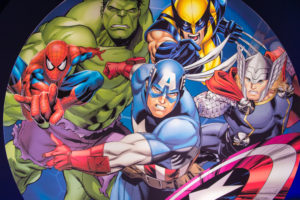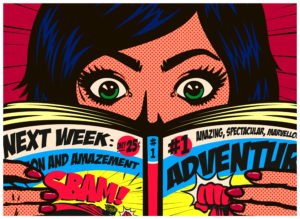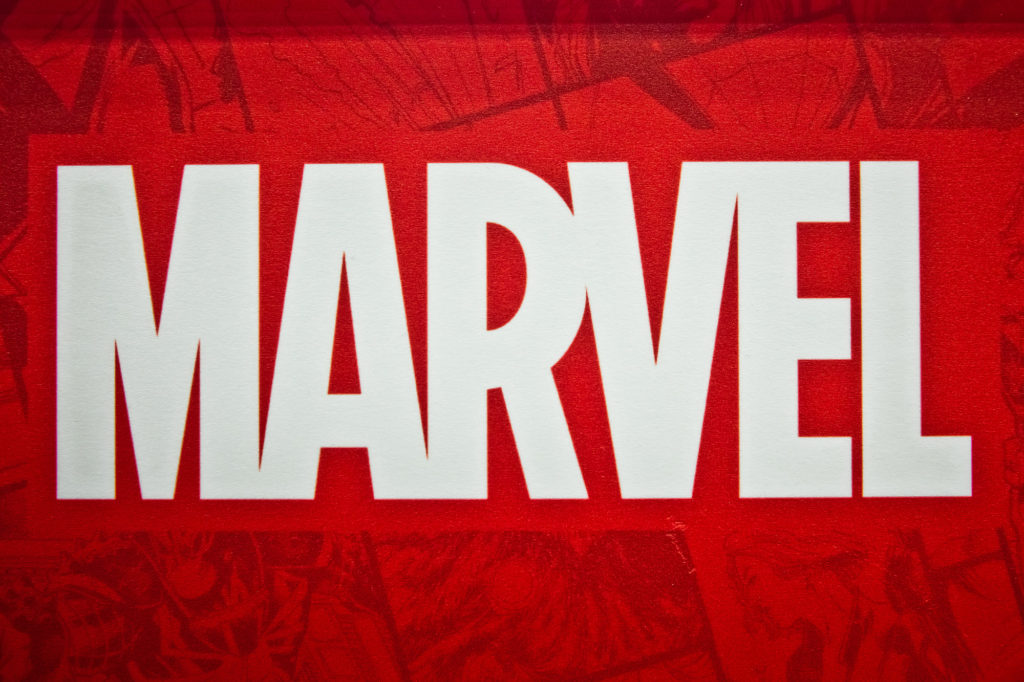A Brief History of the Marvel Cinematic Universe
 If you’re wondering about whether it’s worth diving into the Marvel Cinematic Universe, it can look pretty daunting. The Infinity Saga alone has 23 films, not to mention those about to begin releasing as the next storylines unfold.
If you’re wondering about whether it’s worth diving into the Marvel Cinematic Universe, it can look pretty daunting. The Infinity Saga alone has 23 films, not to mention those about to begin releasing as the next storylines unfold.
This article is intended to break it down so you understand what is going on with the different movies as well as the greater, over-arching storyline of The Infinity Saga.
First thing to differentiate is the difference between the Marvel Cinematic Universe (the MCU) and any other Marvel-based film.
The MCU kicked off with Iron Man in May of 2008. This was the first movie made independently by Marvel Studios. Up until then, they had simply licensed out their characters to other studios and functioned as consultants. Iron Man was followed up by The Incredible Hulk a month later. Since then, every MCU film is based in a shared universe with overlapping characters and storylines. Any film based off of Marvel comic books up until 2008 is not considered a part of the official MCU.
The MCU has been the brain child of Kevin Feige, the President of Marvel studios who, with his team, has intricately planned the entire saga from the outset. Obviously, there’s been a lot of changes along the way, but by-and-large, it has followed his vision from the beginning.
Marvel releases each of their movies in what they call Phases. So far, there have been three complete phases and they make up what is now known as The Infinity Saga. In the list, I’ve also marked my recommendations and “must-sees.”
Christopher’s Recommended Watch List
Here’s a quick list of the 3 Phases, starting with the first Iron Man and culminating in the fourth Avengers film, Endgame with Spider-Man: Far From Home as a kind of epilogue.
Bold indicates the recommended watch list (12 total); * indicates absolute musts (7 total);
PHASE 1
*Iron Man (2008)
The Incredible Hulk (distributed by Universal; 2008)
Iron Man 2 (2010)
Thor (2011)
*Captain America: The First Avenger (2011)
*Marvel’s The Avengers (2012)
PHASE 2
Iron Man 3 (2013)
Thor: The Dark World (2013)
Captain America: The Winter Soldier (2014)
Guardians of the Galaxy (2014)
*Avengers: Age of Ultron (2015)
Ant-Man (2015)
PHASE 3
*Captain America: Civil War (2016)
Doctor Strange (2016)
Guardians of the Galaxy Vol. 2 (2017)
Spider-Man: Homecoming (distributed by Sony; 2017)
Thor: Ragnarok (2017)
Black Panther (2018)
*Avengers: Infinity War (2018)
Ant-Man and the Wasp (2018)
Captain Marvel (2019)
*Avengers: Endgame (2019)
Spider-Man: Far From Home (distributed by Sony; 2019)
Why I’ve Recommended These Films
I’ve selected the films (in bold) that I did simply because I believe you catch the heart of the MCU best through them. Ideally, you would watch all of the titles in bold before Endgame to get the full impact of the culmination, but it’s not necessary. And, in fact, Infinity War and Endgame (essentially one story spread over two films) are clear enough to watch without any previous exposure. However, you’ll likely feel a little lost.
The rest of them can be explained without watching, although a few of them are fantastic films in their own right. Black Panther, for example, is one of the best MCU films as far as depth of character and theme and quality of production and includes one of the MCU’s best villains. It just doesn’t impact the overall storyline of The Infinity Saga and since the main character is introduced in Civil War, the Black Panther movie is optional in my mind. A handful of the remaining films could be skipped altogether (Iron Man 2, Thor 2: The Dark World, Guardians of the Galaxy Vol. 2, and Ant-Man).
The thing is, if you watch these first few recommended movies, you may be compelled to learn more about the characters through their other films (such as Black Panther or Spider-Man) but, like I said, those films are not essential in my opinion.
It may be helpful to break down the character arcs a bit (without spoilers!).
Important Story Arcs

Iron Man, Captain America, and Thor are the core trio to the MCU and their stories culminate in Avengers: Endgame. Iron Man and Captain America in particular, have mirroring arcs.
Tony Stark (Iron Man) is the arrogant, quick-witted, self-focused, sleazy genius billionaire and Steve Rogers (Captain America) is the tortured-soul, man-out-of-time who is always putting other people’s needs before his own. Captain America’s conviction is constantly butting heads with Iron Man’s ego and the tension explodes in Captain America: Civil War.
Their relationship is possibly best encapsulated in this conversations from The Avengers (2012):
STEVE TO STARK: “Big man in a suit of armor. Take that off, what are you?”
TONY: “Genius, billionaire, playboy, philanthropist.”
STEVE: “I know guys with none of that worth ten of you. Yeah, I’ve seen the footage.”
STEVE (CONT’D): “The only thing you really fight for is yourself. You’re not the guy to make the sacrifice play, to lay down on a wire and let the other guy crawl over you.”
TONY: “I think I would just cut the wire.”
STEVE (SMILING): “Always a way out… You know, you may not be a threat, but you better stop pretending to be a hero.”
TONY: “A hero? Like you? You’re a lab rat, Rogers. Everything special about you came out of a bottle!”
Their characters spend most of The Infinity Saga caught in the struggle of these narratives. Stark coming to grips with his privileged “me first” self-indulgence and Rogers proving that he’s more than a juiced up dweeb.
Each of the movies I selected either move these character arcs toward Endgame or explain important details that help develop the backstory of Thanos (The Infinity Saga villain), the Infinity Stones, or other essential details that add weight and depth to the themes, conflicts, and redemptions.
Regarding Content

Originally, I wrote this up for a handful of friends who wanted to understand and start watching the MCU but didn’t know where to begin. So, I’m writing with the assumption that you’re okay consuming secular entertainment and watching superhero movies. There is a legitimate discussion worth having about how much time and energy Christ-followers should put into things like movies and entertainment.
However, this is not intended to be a rigorous defense of movies or superheroes. If you’re interested in my thoughts on that, let me know. That’ll come in another article, perhaps 1-2 years from this one.
(That was a joke.)
Nevertheless! There are still content concerns with the MCU as there are with any movie I watch (even “Christian” ones!).
Every MCU movie is different. Some are action driven, some are humor driven, and some have a heavy amount of drama. Most have a pleasant mixture of everything. The humor and light-heartedness has historically been what sets the MCU apart.
It’s really complicated to give a summary of what the content issues in all the Marvel films are. You can’t just say “These are all the content problems with the MCU” because every film is different. Furthermore, the movies have matured and the standards have evolved as the MCU both established itself as a filmmaking leviathan and merged into Disney, which is a family-centric film company.
As a result, the early Marvel films tended to be more “bloody” and sexualized and as Disney took the reins they became (somewhat) more family-friendly. Lightly sexual scenes and innuendos are more common in the earlier films but not entirely absent in the recent ones.
A good example of this is how the filmmakers present the character Natasha Romanov aka “Black Widow” in the early films versus the more recent ones. Between camera angles and costume choices, she’s treated a lot more like a legitimate character and less as the sexy superheroine trope.
Although never as violent and dark as DC or even the Lord of the Rings, the MCU is packed with punching and flipping and kicking and, occasionally, military-style fire-power.
The early movies focused primarily on the origin stories of some of Marvel’s safest characters (at least the ones they had film-rights to). But as the MCU took off and Marvel Studios established themselves as a legitimate company, they began introducing characters like the Guardians of the Galaxy, Ant-Man, and Doctor Strange. These films introduce the weird aspects of Marvel Comics, such as the Cosmic storylines of the Guardians, the quantum realm of Ant-Man, and the multiverse and magic of Doctor Strange.
Up until these movies, Marvel had tried hard to ground itself in “scientific” explanations for their superheroes.
Iron Man was the mechanical ingenuity of genius billionaire Tony Stark, Captain America was a World War 2 super-soldier created in a lab, Hulk was the bi-product of gamma radiation, and Thor was a “god” from Norse mythology who turned out to simply be an alien from a planet known as Asgard.
But when Doctor Strange came along, they introduced the mystical or spiritual side of the MCU that had never been explored before. They also reveal, through Doctor Strange, that the MCU is a part of a multiverse of hundreds, millions, maybe even billions of other worlds.
The Hidden Depth of the MCU (Mild Spoilers!!!)

The MCU gets a bad rap for being cheap, action heavy entertainment that over-employs bathos as a counter-balance to the never ending violence. And I can see why people would conclude that.
But it also manages to sneak in some pretty deep and impactful themes under the guise of cheap thrill blockbusters.
Fatherhood, legacy, and family are actually some of the most consistent themes that come up within the MCU. Tony Stark’s troubled relationship with his father and his legacy as an arms dealer. The Guardians of the Galaxy’s rag-tag band of misfits learning to work together and love each other like family. Black Panther’s struggle between the traditions of his ancestors and opening himself (and his country) up to change to do what’s right.
It even manages to weigh in on big topics like government overreach and the consequences of violence.
Let me talk about those for a minute.
During The Avengers, New York City was absolutely devastated (oi, that strikes a little too close to home right now) by both the bad guys as well as the superheroes saving it. Typically in film franchises, there’s not a lot of consequences for that. The city’s cleaned up and ready for the next adventure by the time the sequel rolls around. However, the MCU spent the next several years dealing with the consequences of the Battle of New York from The Avengers.
Iron Man 3 (a grossly under-rated film) deals with Tony Stark’s PTSD from The Avengers. In the second Avengers, Age of Ultron (2015), chaos erupts as a result of Tony’s self-willed experiment to enshroud “a suit of armor around the world.” Thousands of people end up dying. This leads into Captain America: Civil War where Tony, loaded with guilt and PTSD, has completely flipped and believes the superheroes should be kept in check by the government.
This struggle between desiring to save the world while also contributing to its chaos sends Tony flying right into Infinity War and Endgame and face-to-face with Thanos.
Steve Rogers (Captain America) constantly wrestles with a depth of conviction and loyalty that almost always puts him at odds with the world he lives in.
The MCU also deals with friendship and what true love is and free-will and identity.
As well as death and grief. This is probably what surprised me the most with Infinity War and Endgame. They were able to handle such deep issues as failure, sacrifice, loss, and death (as well as free will and love) better than even more “serious” films do sometimes.
If I write too much more I’m gonna give it all away. But I hope this helps motivate you to not only give the MCU a shot, but to look for the deeper themes and hidden connections throughout the films.
And then come tell me your thoughts.
Resources
In case you’re interested, I am heavily influenced by a number of film commentators, reviewers, and essayists on YouTube. I’ve been watching and following many of them for several years and I find them helpful, fascinating, and informative in developing my opinions on such matters.
I told someone the other day that I don’t think I’ve ever had a truly original thought. Opinions about the MCU are no exception.
When it comes to dissecting movies, learning about film-making, discovering themes, or anything related to film, these are my sources: